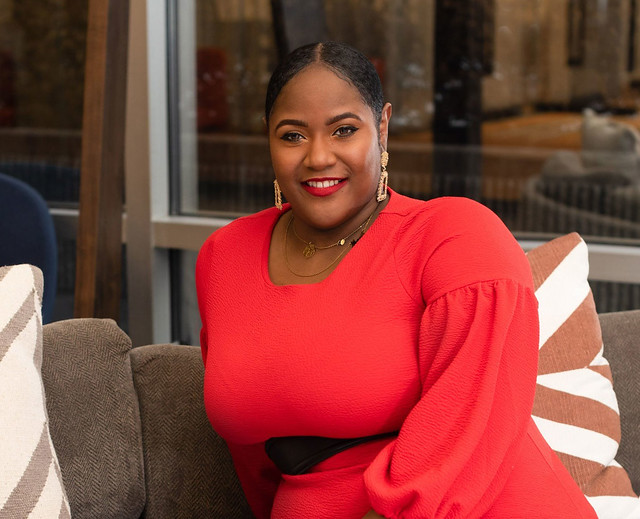
In celebration of Women’s History Month, USDA is proudly sharing stories of women leaders in agriculture who are helping girls and women succeed along the way.
In this blog, we feature Dr. Dominique Carter, Agricultural Science Fellow with USDA’s Office of the Chief Scientist. Dr. Carter’s work touches various research portfolios to measure the performance and impact of USDA science initiatives. In addition to her work, she is also interested in emerging technologies, innovation, and entrepreneurship.
Dr. Carter talked about having a strong work ethic, chasing your dreams, and “taking up space.”
Tell us your journey and how your interest in agriculture developed
I became interested in emerging technologies during my last year of graduate school. I decided to pursue a career that would allow me to combine my desire to improve the lives of others through scientific discovery and innovation, with my interest in science policy. The AAAS Science & Technology Policy Fellowship gave me the opportunity to engage in science policy at a federal science agency, the National Science Foundation (NSF). At NSF, I worked cross-functionally to catalyze global partnerships in science and innovation in Europe and Africa. This work included engagement across the federal government through NSF interagency partnerships for various programs, including the U.S. Agency for International Development (USAID) for the Partnerships for Enhanced Engagement in Research (PEER) program and USDA for Innovations at the Nexus of Food, Energy, and Water Systems (INFEWS) program.
What is your role in the Office of the Chief Scientist? What is a typical workday for you?
I work as an Agricultural Science Advisor in the Office of the Chief Scientist. My portfolio spans across multiple areas so every day is a new adventure! Currently, my work focuses on supporting the Strategic Planning & Performance Measurement and Evidence & Evaluation committees to coordinate performance measurement, progress monitoring, evaluating programs for effectiveness, and science policy development for the Research, Education, and Economics mission area. I also co-lead the Key Performance Indicator (KPI) Innovation Team to develop and identify performance measures to demonstrate the impact of USDA science.
I also support the Pollinator Health Research portfolio for coordinating and tracking all pollinator health research activities across USDA in compliance with requirements from the 2019 Farm Bill. I will also soon support the Sustainable Agriculture Intensification theme team in accordance with the Program Theme defined in the new USDA Science Blueprint.
Who are your role models? Who/what inspires you?
My personal role models include my grandmother and mother as they were the first examples of strong, resilient women in my life. They taught me the importance of hard work, how to be assertive, and encouraged me to be in relentless pursuit of my dreams always. Everything I am is because of who and what they are.
What personal challenges have you encountered and how did you overcome them?
Some personal challenges I have encountered include being underestimated and resultantly underutilized in some academic and professional settings. As a recent Ph.D. recipient from the Microbiology, Immunology, and Molecular Genetics Program at the Medical College of Wisconsin, I learned the importance of speaking up, seeking opportunities to develop and demonstrate my skillsets, volunteering for projects, and seeking professional mentorship.
What advice would you give to girls and young women who want to enter agriculture? What advice do you have for fellow women in agriculture, both in USDA and in the private sector?
My advice to girls and young women interested in agriculture is to advocate for yourself and always seek opportunities to learn more and develop your skills. I am passionate about getting more girls, women, and underrepresented minorities to study STEM subjects. It’s also important to identify and cultivate professional and peer mentor relationships. Many opportunities are discovered through networking. Finally, I would encourage them to take up space! Do not minimize yourself for the convenience of others.



